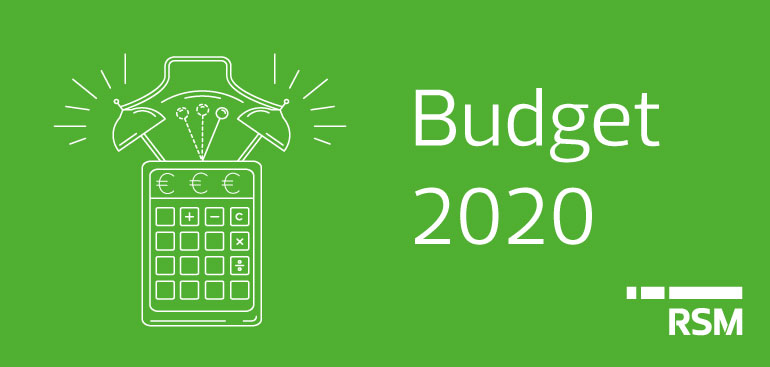
Budget 2020 was flagged in advance as a “no surprises” budget by Minister Donohoe and it lived up to that expectation in the main. As anticipated, tax relief measures for the vast majority of taxpayers were non-existent but on the positive side there were no increases in direct or indirect taxes. The Minister commented in his budget speech that “the unfunded tax cuts of today is the unwelcome tax increase of tomorrow” and a prudent fiscal policy is understandable in the current economic uncertainty.
The only changes to income tax are to the home carer credit up €100 per annum and the earned income credit up €150 per annum. The earned income credit which applies to the self-employed now reaches €1,500 but is still shy of the PAYE credit at €1,640. Taxpayers across the board will of course be hit by the increase in costs such as the increase in fuel costs.
The main focus of the budget was on Brexit, framed around a disorderly exit, with substantial spending packages announced which will only be utilised in the event of a no deal Brexit. These packages will come from borrowed money and will be targeted towards agriculture, enterprise and the tourism sectors. While the Department of Finance has endeavoured to quantify the impact of a hard Brexit on the economy, projecting a slower pace of growth, it is clear that the full impact cannot be known with certainty.
Budget 2020 contains little by ways of tax saving measures for the SME sector, as is the case for taxpayers generally. Some improvement in R&D credits was announced for micro and small companies with the tax credit for R&D spend increasing from 25% to 30% and relief for pre-trading R&D announced. Some welcome improvements in KEEP share scheme (Key Employee Engagement Programme) were announced including bringing part time employees within the scheme. Under this scheme employees can avail of CGT on disposal rather than income tax on exercise of the share options.
Preservation of the 12.5% rate of corporation tax is confirmed as expected. Existing income tax schemes which benefit inbound and outbound employees have been extended to 2022 without change. Some anti-avoidance measures will be introduced with effect from Budget night for perceived abuse of the current Irish Real Estate Funds (IREFs) and Real Estate Investment Trusts (REITs). BEPS measures will continue with transfer pricing requirement in Ireland expanded and provisions to be introduced to prevent arrangement that exploit differences in tax treatment of an instrument in different jurisdictions to generate a tax advantage
Companies or individuals buying commercial property will be impacted by an immediate increase in the stamp duty rate by 1.5% from 6% to 7.5%. Given that the rate of stamp duty was 2% until 2017, the 7.5% represents a sizeable increase over two years. The existing rate of 6% will apply to contracts executed before 1 January 2020 where a binding contract existed prior to Budget day. Relief will continue to be available for land sold which is subsequently used for residential development to ensure that the stamp duty ultimately payable remains at 2%.
The tax-free CAT threshold from a parent to a child has increased from €520,000 to €535,000 for gifts or inheritances received on or after 9th October. This is a continuation of a slow creep in the threshold which stood at €540,000 at a peak before taking heavy hits in recession budgets. The other two, strangers for blood relatives and strangers remain unchanged at €32,500 and €16, 250 respectively. The issue of market values in family homes inherited has again not been specifically addressed.
The EIIS tax relief for individuals investing in companies has been re-instated at full relief of 40% in year 1 of the investment. This had been split at 30% in year 1 and 10% after year 3, dependent on certain conditions being met such as growth in employment numbers in the company. There have been increases in the annual investment limit to €250,000 from €150,000 and up to €500,000 where the investment is left in place for a minimum period of 10 years.
The Entrepreneur Relief has remained unchanged at €1m at the 10% rate of CGT. There may be some future improvement when the Department of Finance consider the outcome of an external review of this relief. Given that the UK equivalent relief is on gains up to €10m, the relief in Ireland falls well short.
An interesting change announced is a substantial overhaul of the system for companies paying dividends in respect of the level of Dividend Withholding Tax (DWT) deducted. Potential tax leakage was identified by the Department of Finance on dividends being paid without income tax being returned by the recipient. The rate of Dividend Withholding Tax will go up by 5% in 2020 but the main change will come in 2021 when it moves to real times rates per taxpayer similar to the PAYE system under PAYE modernisation. Potentially this will add to the compliance costs for businesses paying dividends.
A range of carbon tax measures were announced as expected and gives rise to an overnight increase in fuel at the pumps. Increase on other fuels has been delayed until May after the winter heating season. Hauliers are protected from the impact through an existing Diesel Rebate Scheme. The zero benefit-in-kind on electric company car up to €50k in value has been extended to 2022.
Overall it is to be welcomed that business and personal taxpayers are not directly bearing the brunt of the Brexit risks through tax hikes. Time will tell if the Brexit spending measures announced are adequate to combat the potential impact of a hard Brexit and maintain economic stability.
